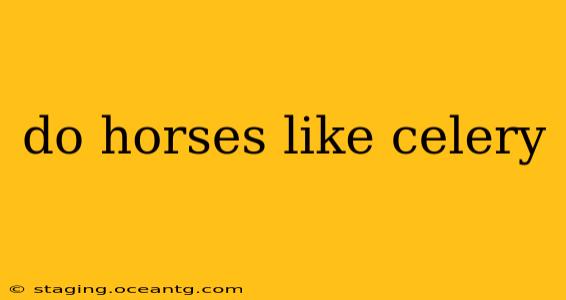Do Horses Like Celery? A Deep Dive into Equine Dietary Preferences
Celery, a crunchy and low-calorie vegetable popular with humans, often sparks curiosity regarding its suitability for other animals, particularly horses. The simple answer is: horses can tolerate small amounts of celery, but it shouldn't be a regular part of their diet. While not toxic, celery offers minimal nutritional value for horses and presents some potential drawbacks. Let's explore this further.
What Nutritional Value Does Celery Offer Horses?
Celery is primarily composed of water and fiber. While fiber is crucial for a horse's digestive system, the amount in celery is negligible compared to the fiber-rich hay that forms the cornerstone of their diet. Celery lacks the essential vitamins, minerals, and proteins horses require for optimal health. Therefore, offering celery as a treat provides little to no nutritional benefit.
Are There Any Risks Associated with Feeding Celery to Horses?
While not inherently toxic, several factors make celery a less-than-ideal treat for horses:
- Choking Hazard: Celery stalks can be long and difficult for horses to chew and swallow safely. Smaller pieces are less of a risk, but the possibility of choking remains.
- Pesticide Residue: Commercially grown celery may contain pesticide residues, which could harm a horse's health if consumed regularly. Always wash celery thoroughly before considering giving it to your horse.
- Gastrointestinal Upset: Introducing a new food, even a seemingly innocuous one like celery, can potentially upset a horse's digestive system, leading to diarrhea or colic. It's always best to introduce new foods gradually and in small quantities.
- Low Nutritional Value: As mentioned, celery offers minimal nutritional benefits compared to hay, grains, and other horse-specific feeds. Focusing on a balanced, nutritionally complete diet is far more beneficial.
What Are Better Treats for Horses?
Instead of celery, consider offering your horse treats specifically formulated for equines. These treats are designed to provide supplemental nutrition and are less likely to pose a choking hazard or digestive issues. Some suitable options include:
- Small amounts of carrots or apples: These offer some nutritional value and are generally safe for horses.
- Commercial horse treats: These are readily available at feed stores and are formulated to meet horses' nutritional needs.
- Small handfuls of high-quality hay: A great reward and provides important fiber.
Can I Feed My Horse Celery Occasionally?
In small quantities, a piece or two of celery likely won't harm a healthy adult horse. However, it’s crucial to prioritize a well-balanced diet of hay, grain, and potentially supplements, tailored to your horse's individual needs and age. Always consult with your veterinarian or an equine nutritionist to determine the best diet for your horse. They can advise you on the appropriate feed amounts and types of treats to ensure your horse receives optimal nutrition and remains healthy.
Remember, a horse's digestive system is sensitive. While small amounts of celery might not cause immediate harm, it's best to avoid it altogether and focus on providing a diet rich in nutrients that support your horse's overall wellbeing.
